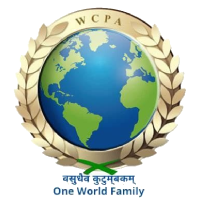Human Destiny Is In Our Hands
Glen T. Martin
Our age is called the “Anthropocene.” Geologists, who deal in millions of evolutionary years, call it that. The name has also taken on common usage. It means that the ecosystem of the planet is in our hands. It means that the capacity to make the war to end all wars through universal extinction is in our hands. It means that the fate of the Earth and all its living creatures is in our hands. How can we, as seemingly powerless individuals, deal with this magnified level of responsibility?
This brief essay explores the latest insights into our human situation arising from quantum theory indicating a paradigm-shift in the way we understand our ability to transform our selves and our world. We possess a very real capacity for influencing the future of our planet. It shows the relevance of the Constitution for the Federation of Earth to these insights, pointing the way toward a truly peaceful, just, and sustainable world system.
Contemporary science has, of course, much to tell us about our human situation. Scientific cosmology has revealed that all things are rooted in a “quantum plenum” within which space and time do not appear to exist. Evolutionary cosmologist Ervin Laszlo calls this plenum “the Akashic Field” after the similar idea of a plenum described in the Upanishads of ancient India (2007). The world appears rooted in the quantum plenum and arises from this field as a vast manifold of galaxies, stars, planets, force fields, evolutionary processes, planets, and living creatures.
Our minds, including our physical brains, emerge from this quantum plenum, as contemporary physicist, Henry Stapp, makes clear (2011, Chap.1). We are not mechanical cogs in a vast causally determined universe of impersonal forces as Newtonian physics supposed. Stapp reasons that our selfhood emerges as an expression of this “interconnected whole.” We are expressions of the whole and our responsibilities are connected to it: “With our physically efficacious minds now integrated into the unfolding of the uncharted and yet-to-be-plumbed potentialities of an intricately interconnected whole, the responsibility that accompanies the power to decide things on the basis of one’s own thoughts, ideas, and judgments is laid upon us” (ibid., 117).
In a universe of fields within fields, wholes within wholes, the whole with which we are most intimately connected is humanity—our common anthropological, civilizational, and ethical wholeness. Our thoughts, ideas, and judgments influence human destiny. In our day of on-going climate collapse and ever-possible nuclear war, our thoughts and ideas may even determine whether humanity will survive and flourish or whether we will end in self-extinction. What and how should we be thinking?
When we critically examine our human situation, we find that there are patterns of thought and social institutions that continue to mirror the Newtonian assumptions that contemporary science has long since abandoned. The dominant economic institutions still require us to think and act in terms of competitive self-interest, rather than in terms of our collective human destiny. The dominant political institutions (a global system of militarized sovereign nation-states) requires us to think and act in terms of national self-interest, rather than in terms of our common human destiny.
Our thoughts, ideas, and judgments lead us inexorably to conclude that all war should end, and that peace should prevail on our planet. They lead us to conclude that universal human rights and dignity should be honored and respected everywhere on Earth. They lead us to conclude that humanity should be united to combat climate destruction and to restore the health of the Earth as a happy home for future generations. None of these appear possible without a united world.
We see that major thinkers have pointed to the possibility and necessity for a united humanity. Albert Einstein declared that we must have “one world or none” (1968, 421). Albert Camus affirmed that only a world parliament could move us beyond a world in which we are forced to be either victims or executioners (1986, orig. pub. 1946). Ervin Laszlo shows that we need to attain a common human “harmony and coherence” in which we cooperate for a planetary common good (2020, 19-20). Buckminster Fuller writes that as we achieve an “Earth planet-based humanity,” we will “be free in the sense that [we] will not struggle for survival on a “you” or “me” basis, and will therefore be able to trust one another and be free to co-operate in spontaneous and logical ways” (1972, 95).
Quantum science has not only shown the significance of human thought in the scheme of things, it has revealed the power and freedom of the emerging human coherence when we drop the superficial divisions of race, religion, nationality, and culture and see one another in terms of our common humanity. Physics has experienced a complete paradigm-shift, Stapp affirms, in which “a purported theory of matter alone is converted into a theory of the relationship between matter and mind” (ibid., 20). We can transform our Earth and our human condition through what I have called our “objective utopian values,” values that embrace the unity in diversity of our human condition (2021).
The Constitution for the Federation of Earth begins with the declaration that we are “conscious that humanity is one” and that this very consciousness is “the basis for a new age when war shall be outlawed and peace prevail” (2016, 70). The insights of the above thinkers can be actualized only when we transcend the artificial divisions imposed by the outdated global economic system and its partner the system of militarized sovereign nation-states, both of which originated in the pre-quantum Newtonian era. Human destiny depends on our collective human decisions, on our consciousness “that humanity is one,” and the Constitution—like a laser beam—concentrates our capacity for making universal, life-affirming decisions.
The Newtonian era tended to view human beings as isolated atoms disconnected from the natural world and from one another. Capitalism and the system of militarized sovereign nations think in this way. Today we understand that all things are interconnected and interdependent and that our human minds connect directly with the quantum plenum in which the entire natural world is rooted. Many advanced thinkers, such as Errol E. Harris (1992, 12), have concluded that the universe has become conscious of itself in us. Philosopher Raimon Panikkar declares: “I am the connecting link between the past and the future, between myself and others, and this on a cosmic and universal level from which not a single being is excluded” (1979, 379).
The thinking of each of us can influence others, and the thinking of each of us can foster the coherence and cooperation of the whole. Yet in order to save ourselves we need to magnify this power dramatically. We must be united in our vision. The Earth Constitution offers a brilliantly designed system for converting our planet to coherence and evolutionary synergy. It is a practical tool for planetary cooperation, extending democratic governance to our planet as a whole. Human destiny is in our hands as individuals, but our ability to guide human destiny is magnified immensely when we unite humanity under a common economic and political system designed to allow us to work together and “cooperate in spontaneous and logical ways.”
If each of us is concerned with our common human destiny, the most effective thing that we can do to promote this is work for the ratification of the Earth Constitution. Alone we can do little, especially as we remain fragmented within militarized rival nation-states and global competitive economics. By working for ratification of this Constitution, we simultaneously work toward uniting humanity within a dialogue-promoting and unity-promoting system that can transform our chaotic and broken world into wholeness and harmony.
Developing our spiritual awareness (our sense of the whole) is not enough unless this eventuates in real structural transformation of our broken world system. Cooperation requires a global perspective: all of us. As planetary thinker Mortimer Adler expressed this: “’All’ – when what is meant is all without exception – is the most radical and perhaps the most revolutionary term in the lexicon of political thought…. That we are now for the first time in history beginning to mean all without exception when we say ‘all’ is another indication of the newness of the emerging ideal of the best society, the institutions of which will benefit all men everywhere” (1991, 90).
This is precisely the role of the Earth Constitution. It provides the institutional arrangements necessary to make this “all” a reality. It requires not only that we think in terms of the wholeness of humanity but that we act to bring about institutions premised on the wholeness of humanity, on the wholeness of human civilization, and on the wholeness of our planetary ecosystem.
My forthcoming book The Earth Constitution Solution: Design for a Living Planet spells out and elaborates the points made in this essay, and it also shows in detail why the UN system must be integrated under the Earth Constitution. Human destiny is indeed within our hands. We must unite humanity under the banner of the Constitution for the Federation of Earth, transforming our world system to one of genuine peace, justice, and sustainability.

